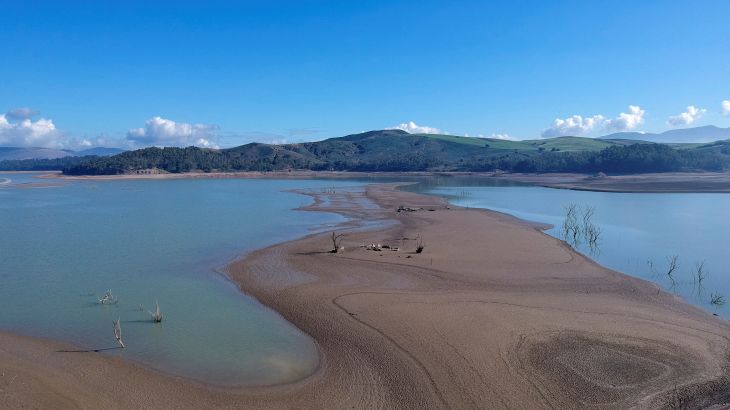Tunisia to cut water supplies to citizens overnight amid drought
The drought-hit country announced other tight restrictions on water usage as it braces for another baking summer.

Tunisia will cut off water supplies to citizens for seven hours a night in response to the country’s worst drought on record, state water distribution company SONEDE has said.
The drought-hit country announced other tight restrictions on water usage – as it braces for another baking summer – including a ban on the use of potable water for irrigating farmland or green spaces, or for cleaning public areas or cars.
Keep reading
list of 4 itemsWave of raids, arrests target government critics in Tunisia
Anti-gov’t protests in Tunisia on revolution anniversary
Tunisia increasingly isolated under Saied as US loses interest
SONEDE said on Friday that the water will be cut off daily from 9pm until 4am, with immediate effect.
Mosbah Helali, its head, said the drought in the country, brought on by the scarcity of rain across four consecutive years and which SONDE attributed to climate change, was unprecedented, and called on Tunisians to understand the decision.
He said fines and even prison sentences were being considered if the rules were broken.
Residents of several areas of the capital have already complained of unannounced cuts to their mains supply at night since the start of the fasting month of Ramadan, when many stay up late.
“Years of drought and low water flow into reservoirs has impacted the country’s water stocks, which have reached an unprecedented situation,” the ministry said.
The new decision threatens to fuel social tension in a country whose people suffer from poor public services, high inflation and a weak economy.
The North African country’s dams are at critical lows following years of drought, exacerbated by pipeline leaks in a decrepit distribution network.
Tunisia recorded a drop in its dam capacity to approximately one billion cubic metres, or 30 percent of the maximum, senior agriculture ministry official Hamadi Habib said.
Farmers’ unions have voiced fears for the coming season, particularly as regards cereals. A poor domestic harvest would compound Tunisia’s problems procuring sufficient flour in the face of skyrocketing international wheat prices since Russia’s invasion of Ukraine early last year.
The Tunisian Federation for Agriculture and Fisheries said thousands of hectares of farmland risked being left fallow due to the lack of rain.
“This year’s cereal season will be catastrophic – there won’t be a harvest,” spokesman Anis Kharbech told Tunisian media. He said projected yields would not even be enough to provide seeds for next year’s crop.
Tunisia’s agricultural sector usually accounts for 10 percent of gross domestic product (GDP).
Scientists have said that recurring heatwaves are a clear marker of human-caused global warming, and that droughts worldwide are set to become more frequent, longer and more intense.